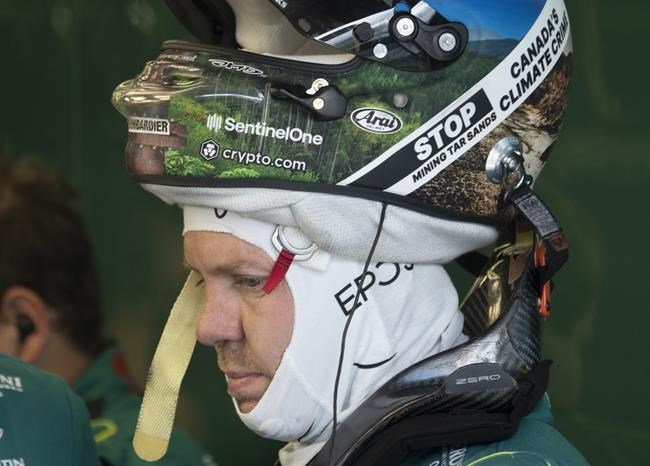WASHINGTON — The "over-the-top hypocrisy" outspoken Formula One driver Sebastian Vettel displayed on his T-shirt and helmet last weekend in Montreal is just the sort of thing Premier Jason Kenney says he needs to disprove and discredit the critics of Alberta's oilsands.
Kenney visibly relished the chance Thursday to denounce Vettel as a hypocrite after the German driver showed up at Circuit Gilles Villeneuve for the F1 Canadian Grand Prix in a T-shirt that described the oilsands as "Canada's Climate Crime."
Vettel also wore a specially designed helmet during practice and qualifying sessions Friday and Saturday that featured the same slogan, along with pipeline graphics and images of natural forest juxtaposed with a post-industrial wasteland, and the message, "Stop Mining Tar Sands."
"I am happy with what Sebastian Vettel did, because I think … it's almost like a cartoon caricature of hypocrisy," Kenney said Thursday during a visit to the U.S. capital, where he's part of a delegation that's trying to rehabilitate the public image of Alberta energy.
Vettel drives for Aston Martin, which is supported by Saudi Aramco — a Middle Eastern petroleum giant with "probably a higher carbon footprint than virtually anybody on the planet," Kenney said.
"I think is a perfect learning moment for us to say that the opposition to the oilsands is coming from people who do not have an inkling about what we do, and are often covered in hypocrisy."
Kenney took part Thursday in a roundtable discussion at the Wilson Center's Canada Institute with members of the Pathways Alliance, a consortium of oilsands producers behind a multibillion-dollar carbon capture and storage project they bill as a potential game-changer.
The ultimate goal is to turn Alberta's oilsands production into a net-zero operation by 2050 by capturing the emissions produced by burning natural gas and storing them deep in the spacious and porous geography of Canada's Prairies.
The more short-term objective, however, is to shed the reputation the oilsands have earned as a purveyor of "dirty oil" and make more U.S. lawmakers aware of Canada as a viable, stable option for their country's immediate fossil-fuel needs.
Those needs, Kenney said, are especially acute as motorists contend with soaring gasoline prices, along with record inflation levels, supply-chain pressures, labour shortages and other longer-term symptoms of the COVID-19 pandemic and the war in Ukraine.
"They'd rather solve that problem with Canadian energy than Saudi or Venezuela or dictator oil," he said.
"So I think we can appeal to the vast majority of Americans and people on Capitol Hill, but some of them simply need to know that we are serious about reducing emissions and we respect the environment."
It won't be cheap: officials say the industry expects a final tab of about $2.5 billion a year between now and 2050, including roughly $20 billion to meet an initial target of storing or otherwise eliminating 20 million tonnes of emissions by 2030.
Cenovus Energy CEO Alex Pourbaix said the timeline breaks down roughly into three segments, with the first being dominated by carbon capture and storage. New, less energy-intensive methods for extracting bitumen will make the industry less dependent on natural gas over time.
Those include small-scale nuclear reactors, known as small modular reactors, as well as burning hydrogen instead of natural gas to generate the steam that's used to liquefy the bitumen, and replacing the steam entirely with solvents, such as butane.
"We have a goal of de-connecting the production of oil in the oilsands from the emission of CO2," Pourboix said.
"If we're able to do that, I think we really make a compelling case that Canadian oil should be the preferred barrel of oil certainly for U.S. imports, but we would argue worldwide."
This report by The Canadian Press was first published June 23, 2022.
James McCarten, The Canadian Press



